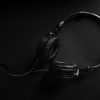Shane Cooper is a multi-talented South African musician whose work spans the genres of jazz and electronica. As a jazz musician, he is widely acclaimed as one of the country’s most innovative bass players, picking up a South African Music Award for Best Jazz Album in 2014.
Card On Spokes, his electronic act, has been gaining incredible momentum in recent years despite the difficulties posed by South Africa’s relative isolation from the international electronic music scene. Card On Spokes has shared the stage with Little Dragon, Daedelus and Clap! Clap! and has received airplay on BBC Radio 3 and Radio 6, as well as support from Gilles Peterson and Boiler Room. His live performance on the Cape Town Allstars edition of Boiler Room in 2016 paved the way for the release of his latest EP, As We Surface, a blisteringly good collection of bassy, groovy tracks that will particularly appeal to electronic music fans who value compositional excellence, inventiveness and risk-taking. From sub-heavy house flavours to cool acid jazz and intriguing African influences such as maskandi and kwaito, Card On Spokes is able to deliver musically interesting tracks with solid dancefloor beats, offering up a truly hybrid and progressive sound, a glimpse of “the dance of things to come.”
We caught up with Card On Spokes to hear about his influences, the gear he can’t live without, and his feelings about branching out into virtual reality…
Hi there, how are you and what are you up to today?
I’m very well. I’ve been doing admin today, nothing exciting.
What are the 5 albums that have influenced you the most?
DJ Shadow , Preemptive Strike
Jaco Pastorius, Jaco Pastorius
Wagon Christ, Musipal
Radiohead, OK Computer
Miles Davis, Kind Of Blue
Which other artists are you into at the moment and why?
Brainfeeder artists are really great, and the label as a whole for bending genres the way they do.
Are there any key pieces of equipment that you are using to define your sound?
My Fender Jazz Bass is used on a lot of tracks.
Where do you gather song-writing inspiration?
From nature and visual arts.
What’s the best gig you have ever done and why?
Touring Germany with Lionel Loueke and the Kyle Shepherd Trio as a bassist. Lionel is one of the most important voices in the world of guitar playing, so it was a massive inspiration playing with him.
And the worst?
Getting a request for an Abba tune while taking a synth solo on my own music.
Where do you see the future of recorded music heading?
Well I’m not quite sure where it’s heading, but I’m very curious to see how musicians involve themselves in the fields of augmented reality and virtual reality. I’m excited about those spaces, and I’m hoping to explore some VR projects with music in the near future. What does the music industry need? Well, it is still sad to me that companies like Apple are effectively making big money from music by selling their devices and controlling streaming services, while streaming services themselves are creating a decline in revenue for the vast majority of artists. What’s important to me is that people still buy albums that they like, whether on vinyl or from sites like Bandcamp, which offer some of the best deals to the artists themselves.
Is there anything about being South African that, in your eyes, has brought something unique or interesting to your sound?
South Africa has a very rich and layered history of music, and much of it is entirely unique. Dance culture is strong here, whether in joy and celebration, or in anger and protest. Rhythm seems inherent to this place: if I leave my studio now, I’ll find it down on Main Road. The way people speak, the way people move and interact. South Africa is also mostly overlooked in terms of the international music industry, so there’s a fierce independence here among artists, and I think that’s a strength of ours.
How are you feeling about 2017? In your eyes, do periods of political/social upheaval and uncertainty produce better artists?
Well I think the best art is informed by real emotion and real reactions. If an artist is too comfortable, or oblivious to what’s going on in the world, then how can they relate to real people? The world is in a very bad state right now, and it has been for a long time. I am glad that more people are getting involved in movements for positive change, and engaging in healthy debate and discourse.




